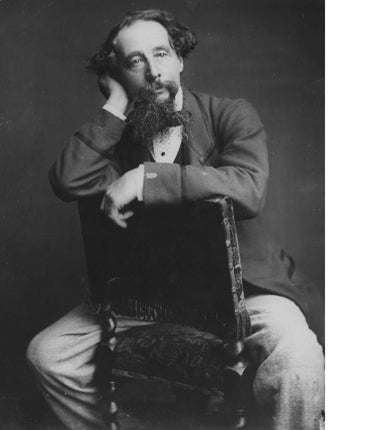Why Dickens was not the family man history would have us believe
A new film exposes the married father-of-10's 13-year affair with a young actress – and his possible love child, writes Arifa Akbar

To his contemporaries, Charles Dickens was a revered man of letters, a married father-of-10 whose serialised novels offered searing social commentaries into the dubious morality of Victorian England.
What they did not know, and what Dickens himself strove to hide for more than a decade, was that he was having a secret love affair with a young actress, Nelly Ternan, for 13 years, with some evidence he may have fathered a child with her.
Now a film is set to expose this little-known aspect of Dickens' life, first documented in Claire Tomalin's revisionist biography, The Invisible Woman.
Yet the drama, announced by BBC Films at the Cannes Film Festival yesterday, will go further than Tomalin's book – which suggests he might have been a father to a bastard child – by featuring their baby, who died of illness before it reached one year of age.
The script will be written by Abi Morgan, who wrote the screenplay for the film adaptation of Monica Ali's Brick Lane. A director and cast have not yet been named.
To guard his good name for a public who idolised him, the devoted Ms Ternan agreed to disappear when suspicions were raised over their relationship. They removed almost all traces of their life together and she reappeared only after his death with a new identity. Dickens' wife, who knew of the extramarital affair, helped to conceal Ms Ternan' presence in their home the day Dickens died.
Jane Wright, the managing director of BBC Films, said the film would show the writer in a "fuller light" to audiences and Dickens fans. "It's a bittersweet story about love and how important that is to all of us," she said.
What appeared to be unique to Dickens' writing, she added, was that he incorporated whomever he met, and wherever he went, into his writing. While literary historians have never been able to pinpoint which, if any, of Dickens' characters represent his mistress, the film would offer that question up to the viewer for speculation.
It is ironic, added Ms Wright, that for a man concerned with "describing his world with such honesty, he was himself living a lie".

Watch Apple TV+ free for 7 day
New subscribers only. £9.99/mo. after free trial. Plan auto-renews until cancelled.
ADVERTISEMENT. If you sign up to this service we will earn commission. This revenue helps to fund journalism across The Independent.

Watch Apple TV+ free for 7 day
New subscribers only. £9.99/mo. after free trial. Plan auto-renews until cancelled.
ADVERTISEMENT. If you sign up to this service we will earn commission. This revenue helps to fund journalism across The Independent.
But in Victorian England, an affair with a stage actress, for a man of letters whose work in philanthropy included a charity campaign for fallen women, would have irreparably damaged his standing.
"He and Nelly realised they had to make a choice. He was seen as a great writer. Should he abandon this voice [he had acquired] and the world he lived in, for love? Ultimately, they decided that they would conceal their love, and when they had a child, he chose not to give his name to the child," Ms Wright said.
Stewart Mackinnon from Headline Pictures, who is producing the film, said it would not set out to destroy Dickens' reputation but would turn him from a "god" into a "fallible human being with problems and frailties".
The level of secrecy in their affair will be fully dramatised, including a poignant moment when Dickens denied knowing the actress, and another instance when an item of jewellery Dickens picked out for Ms Ternan from a London jewellers was mistakenly sent to his wife.
Within a few years of meeting Dickens, Ms Ternan left the stage and disappeared from public view. Her names, dates and family very nearly disappeared from official records and it was only after the First World War that her part in his life began to be discussed openly, though even then some vehemently denied the possibility of the association. What literary historians have uncovered since is that Ms Ternan went on to marry, become a teacher and have children of her own, following her change of identity. Ms Wright described their love affair as a "very 20th-century relationship".
Join our commenting forum
Join thought-provoking conversations, follow other Independent readers and see their replies
Comments
Bookmark popover
Removed from bookmarks